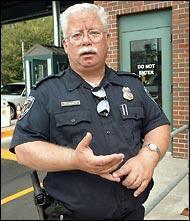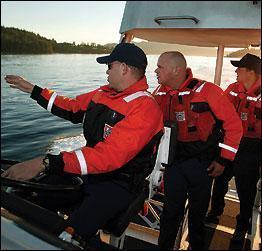 |
 |
|
|||||||||||||||||||||

|
||
|
AFTER SEPT. 11, border security was tightened and traffic now inches along. Airline passengers stand patiently in long lines as their everyday belongings — even their shoes — are inspected. The Coast Guard stepped up its patrols, logging more than 30,000 hours on port security, eight times as much as in years past. And yet despite an initial surge in interest in serving in Americaís armed forces in the weeks after the terrorist attacks, overall enlistment nationwide has not changed appreciably.
The story of the Neah Bay crew
For Coast Guard crew, saving lives now has a new meaning
By Christine Clarridge NEAH BAY, Clallam County — A small blip appears on the radar screen of the 47-foot Coast Guard cutter. It's a boat, running in the night without lights, close to the Canadian border, seemingly trying to avoid detection. Crew members feel a surge of adrenaline as they close in on the vessel. They strain their eyes to peer into the biting cold and darkness, looking and listening. Armed with 9-mm Berettas, radios, flashlights, handcuffs and batons — and two M-16s and a couple of shotguns, just in case — the crew from the Coast Guard's Neah Bay Station is on full military alert. A year ago, the men and women assigned to duty at the isolated tip of the country would likely have been playing cards or watching TV as they waited for the alarms that signal distress at sea. But since Sept. 11, they're soldiers who patrol 100 miles of coastline at the remote northwestern edge of the nation, peeking into every harbor and most little boats, not always knowing what the enemy might look like. "I never thought I'd be looking at friendly older couples and searching their vessels for weapons and bombs," said Jason Gale, 28, a third-generation guardsman and father of two. "Never. But we can't afford not to." His crewmate Sandor Csitar, a 26-year-old petty officer third class who loves catching lawbreakers, agreed. "We know the bad guys could try to get in here, but it's not going to happen on our watch. We take our job very seriously." The Coast Guard's priorities have shifted to national security, and guardsmen on duty spend a lot more of their downtime on patrol. "It's a matter of 'when,' not 'if,' as far as I'm concerned," said Chief Warrant Officer Mike Tumulty, the station's commanding officer. "The coastline is our biggest threat. There's so much of it and it's so open, we have to stay vigilant." Perhaps more so than for any other branch of the military, the Coast Guard's image and priorities have changed in the last year. Though guarding the coastline against smugglers, pirates and foreign powers has been part of its mission since it was established in 1789, the service is known for its search-and-rescue missions and its enforcement of fishing and environmental regulations. It made news when lives were saved, or lost, at sea. But the Coast Guard, which could become a part of the president's proposed homeland security department, is now seen as a key player in the war on terrorism. Coast Guard boats and aircraft are spending less time on rescue and drug interdiction, according to congressional studies, and more time on port security. The Coast Guard also has gotten more money — $482 million in supplemental funding — as well as more recognition and respect. "It's made me more upbeat about what I do," said Fireman Keith Hamilton, a 21-year-old from Spokane and the crew's mechanic. "I feel like I'm really doing something for my country." The patrols are scheduled at varied times and places, so it's not so easy for an observer to figure out where they are and how to sneak by them, said Gale. The ones in the daytime can be pleasant when the weather's good. But night patrols are usually lonely, cold and tedious. "There are hours and hours where you have nothing to do but think," said Gale. "Mostly, about coffee," Hamilton said. They prepare themselves physically and mentally as well as they can. They study the briefs from headquarters with warnings about small vessels traveling erratically or fishing illegally. The wrap themselves up in body armor and load their belts with their radios and guns. If it's not cold, they put on big orange flotation jackets. If it is cold — and it usually is — they put on their thermals, one-piece fleece suits, dry suits, jackets, boots, gloves and balaclavas or ski masks. But there's little they can do to prepare emotionally when the night holds so much that's unknown. Their shift could last more than 40 hours if they're called to perform a rescue at sea, or it could involve hours of waiting — just sitting in the darkness off the edge of the horizon, watching a suspicious vessel. The loud engine of the 47-foot cutter makes it hard to chat. The crew members stand, each at his own station, on the exposed upper bridge of the self-righting metal vessel and fight the wind and the waves to scrutinize everything that moves and to see what's in each little boat. They size up each boat and its occupants. Are they coming from an unexpected direction or dodging back and forth as if trying to avoid detection? Are they fishing where or when they're not supposed to be? Are there life jackets on board? Most of what they do is straightforward enforcement of marine laws and education of erring mariners. But sometimes it's more. There are drug runners, which is what the Coasties suspected of the fishing the vessel they chased near the Canadian border. There are people smugglers and fish poachers out there. "We've always been at war against lawbreakers," said Csitar, a native of Canada who dreamed for years of serving in the military. "It's just that now the rest of the country realizes it." Csitar, who's married to a customs agent, said he got into the Coast Guard to do the aggressive kind of law enforcement work he's doing now. But Gale, who grew up in a military family, was drawn to the Guard's more humanitarian mission of search and rescue. He plans to attend the Coast Guard's heavy weather surfman school at the mouth of Columbia River in Oregon. His father flew helicopters for the Guard during the Vietnam War, plucking Marines from the ocean. His grandfather drove amphibious boats like the kind landed at Normandy during World War II. Ever since he was little, Gale wanted to be like them, braving danger to save others. While Gale and others said that saving lives at sea is still a primary focus of the Coast Guard, statistics show that homeland security consumes far more personnel and resources than in years past. Nationwide, the Guard spent 2,263 fewer duty hours on search and rescue and 4,322 fewer hours on drug interdiction than in years past. "It's like I joined the fire department, but all of a sudden I'm working for the police," said Gale. "It's not what I joined for, but I made the commitment and I'm going to do it. "We do know that it could happen here," he added. "Sometimes we sit around and talk about it, fantasize about it. What if we were the guys who stopped the bad thing from happening?"
Christine Clarridge: 206-464-8983 or cclarridge@seattletimes.com.
|
 Customs inspector Allen Ostrander says tighter border security has meant long, grueling hours.
Customs inspector Allen Ostrander says tighter border security has meant long, grueling hours.
The story of Allen Ostrander
As travelers fret about searches and delays, inspectors struggle through marathon shifts
By Tyrone Beason BLAINE, Whatcom County — When Allen Ostrander's not questioning drivers, he's digging through trunks and glove compartments, kicking tires, crawling under cars, checking beneath hoods and sifting through bags of soiled baby diapers. There are dozens of places in a car or truck to hide drugs or more malevolent contraband like explosives. Few people in the U.S. government carry more authority to poke and prod other people's property than inspectors do. This is a full-contact job, says Ostrander, a senior inspector at the Lynden border crossing, about 15 miles east of Blaine. Ostrander is a former regional vice president of the National Treasury Workers Union, a status that gives him the right to speak to the media without fear of reprimand. "This is not a job for old folks," said Ostrander, a 31-year veteran of the Customs Service. "I'm 53, overweight and beat-up, but I do what I gotta do."
As far as the people who secure the U.S.-Canada border are concerned, their job since Sept. 11 has been just as vital as that of soldiers on the front lines in Afghanistan. The enemies — terrorists — are the same. But securing the border is duty with a difference: For the 30 seconds it normally takes a customs or immigration officer to ask a few routine questions about our travels into and back from Canada, we are all potential suspects. "If you show up at the border, you have no privacy," says Michael Milne, the Seattle-based regional enforcement coordinator for U.S. Customs. "We can search people without probable cause. We can search your person." Good instincts helped border officers in Port Angeles nab accused terror conspirator Ahmed Ressam in 1999 as he drove off a ferry from Victoria, B.C., in a car loaded with bomb-making materials. What if he'd made it through customs? Ostrander, speaking from his farm in Ferndale on a rare day off, notes that 2,500 cars pass through the Lynden crossing each day, each way. "That's 5,000 potential bad people I come in contact with every day," he said. Once he was run over by a motorist who didn't want his car searched. Colleagues have been punched in the nose. A shift from 4 p.m. to 8 a.m. may sound like a nightmare, but in Blaine, Lynden and more isolated border crossings farther east, overnight stints are common because there are simply not enough workers. "If you're working extremely long hours, it's going to affect and impair your ability to do the work," Ostrander said. "It's grueling. It wears on you." Ostrander was planning to retire in a few more years. Then Sept. 11 hit with endless shifts, and the stock-market slide took the air out of his retirement investments. To spend time with his grandchildren visiting from Florida last month, he had to agree to work double shifts the following week. There's been little time to plan a family reunion he'd been looking forward to. Late September is now the soonest it will happen. "Up until probably February or March, it was extremely tough," Ostrander said of the stress. "The traveling public is generally innocent, but they're looking at you asking, 'Why are you bothering me with this stuff? I'm not Pakistani. I haven't been to Afghanistan.' " That's beside the point, he said. "It's a job," Ostrander said with a hint of bravado, "that's got to be done." Tyrone Beason: 206-464-2251 or tbeason@seattletimes.com.
|
||||||||
seattletimes.com home |
| Home delivery | Contact us | Search archive | Site index |


